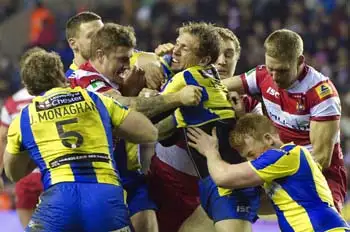The golden point for Super League

Wigan and Warrington served up a round two treat at the weekend, drawing 17-17 at the DW Stadium, which led to much debate across the rugby league phone-ins about whether the golden point should be introduced to Super League.
At present, teams just shake hands at the hooter and accept one point each in the league ladder, and in truth, the point they’ve both lost are hardly going to affect either the Wolves or the Warriors hopes of reaching the Super League Grand Final come October.
But had this game happened in the NRL, fans would have been treated to an extra period, where the next score would have won the match.
As one fan put it, that would be fine if it was your time who scored the winning points, but you would be dead set against it if the match went the other way.
For a team to come away with nothing having been level after 80 minutes would be slightly unfair, and just because the NRL do it, doesn’t mean it’s right.
In other sports that utilise the overtime period, such as ice hockey, the losing team is at least rewarded with an “overtime loss” which typically earns them a point in the league table.
So had Wigan gone on to win in the extra period, the Warriors would have earned two points for a win as standard, but the Wolves would have at least taken one point away from the game. Perhaps that would be the only way it works, but for me, I’d be leaving it alone.
The dual-registration system continues to generate debate, with Hunslet the latest club to issue a statement, although theirs is in defence of it, rather than the attacks against it we’ve seen from others in the Championship.
It seemed a little petty, particularly as I don’t think people have been critical of the Hawks themselves, it’s more been a case of fans criticising the system.
The news that Super League executives pushed it through against the advice of the RFL doesn’t come as a surprise, because the system is of great benefit to the Super League clubs in getting their players match fit.
As for the Championship clubs, while Hunslet were able to field Richard Moore for the majority of the match, they were still beaten 40-0 by Leigh at the weekend.
If the system is there, you can’t blame clubs like Hunslet for using it, particularly when times are tight. If it helps clubs save money to then invest in marketing, media and community programmes, then great. The problem is that the moneys saved are likely to be simply spent on other players.
There has been some fall out from the Widnes v St Helens match on Sunday in relation to the performance of referee James Child – a subject expertly covered by Neil Barraclough in his column.
The Vikings had their opponents held at 4-4 when Ben Cross’ high tackle on Paul Wellens sparked an all-in brawl, which resulted in Widnes losing Jon Clarke, who was presumably fighting against himself, to the sin-bin, as well as Cross, rightfully, to a red card.
Cross wasn’t the only man to cop a ban for a terrible tackle at the weekend – Catalan’s Julian Bousquet will miss four matches for the tackle which left Salford’s Theo Fages unconscious, while Rangi Chase was cited for his attempt at tackling Zak Hardaker in Castleford’s win over Leeds.
Some have said that all three punishments are too lenient.